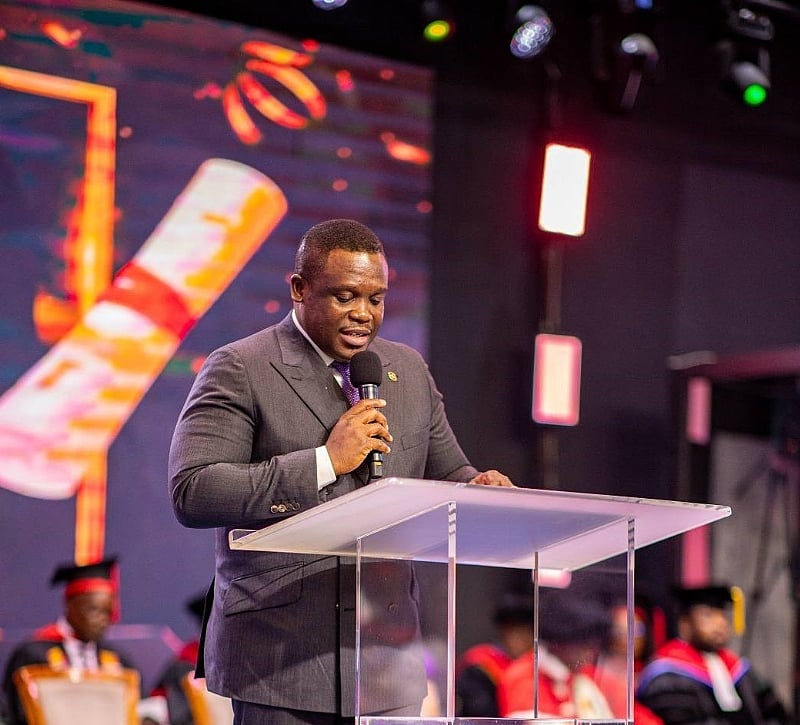Embracing the Digital Future: A Call to Action for Ghana’s Graduates
Samuel Nartey George, Ghana’s Minister for Communication, Digital Technology, and Innovations, delivered a powerful message to the graduating class of 2025 at Perez University College. He challenged them to become architects of transformation in Ghana’s evolving digital economy, emphasizing the need for innovation, integrity, and leadership in shaping a resilient, inclusive, and technology-driven future. Mr. George underscored the dynamic nature of the modern work landscape, shaped by forces such as automation, artificial intelligence, climate change, and demographic shifts. He stressed that traditional career paths are no longer the norm, and success in this new era will depend on adaptability, continuous learning, and the ability to lead.
The Minister articulated the government’s vision for a 24-hour digital economy, powered by smart infrastructure and data-driven public services. This vision, he explained, represents a fundamental shift in how data is utilized, processed, and leveraged to ensure essential services like transportation, healthcare, and digital and creative industries operate seamlessly around the clock, aligning with global time zones. This ambitious goal aims to position Ghana as a key player in the global digital landscape. He highlighted specific government initiatives that support this vision, including the Smart Data Exchange program designed to enhance public service delivery, the expansion of national digital platforms, the One Million Coders initiative aimed at equipping Ghanaian youth with crucial digital skills, and the development of a National Startup Ecosystem to foster innovation, entrepreneurship, and job creation.
Mr. George’s message to the graduates was one of empowerment and entrepreneurial spirit. He encouraged them to be proactive, to create their own opportunities, and to become employers rather than employees. He challenged them to disrupt existing systems and become the driving force of innovation and job creation in Ghana. This call to action reflects the increasing importance of entrepreneurial skills and innovation in navigating the complexities of the 21st-century economy.
Beyond technical skills and entrepreneurial drive, the Minister stressed the importance of ethics and values. He advocated for a value-driven approach to development, emphasizing the need for inclusion, integrity, and a strong sense of purpose. He cautioned that the pursuit of efficiency should not come at the expense of ethical considerations. This focus on values underscores the importance of developing a generation of graduates who are not only skilled but also possess a strong moral compass, capable of navigating the ethical dilemmas that arise in a rapidly changing world. He emphasized the need for a generation that is both technically proficient and ethically grounded.
Mr. George also offered a personal touch to his address, urging graduates to make faith a central part of their journey. He shared his own testimony of the power of faith and encouraged them to embrace their faith as a source of strength and guidance. He linked success to purpose, perseverance, and faith, reminding them that with God as their guide, they could achieve great things. This message resonated with the audience, particularly given the context of the graduation ceremony at a faith-based institution. He called upon the graduates to become agents of change, leaders of their generation, and ambassadors for Christ wherever they go.
Archbishop Charles Agyinasare, the Chancellor and Founder of Perez University College, added his voice to the discussion, appealing to the government to prioritize financial support for private universities. He argued that such support is crucial for expanding access to tertiary education and contributing to Ghana’s overall development. He commended existing government initiatives aimed at supporting education, such as the payment of first-year fees for students in public universities and a pilot free Senior High School program extended to selected private secondary schools. However, he advocated for similar support to be extended to private tertiary institutions. He proposed various forms of financial assistance, such as subsidies, grants, or fee assistance programs, to create a more equitable playing field between public and private institutions.
Prof. Ahmed Jinapor Abdullai, Director-General of the Ghana Tertiary Education Commission (GTEC), expressed his appreciation for Perez University College’s contributions to expanding access to tertiary education. He recognized the significant role played by Archbishop Agyinasare and his wife in transforming a Bible school into a thriving university college. He reaffirmed GTEC’s commitment to supporting private tertiary institutions, especially faith-based universities, in their efforts to provide quality education to underserved students. This acknowledgement highlights the important role that private institutions, including those with a faith-based foundation, play in broadening access to higher education and contributing to the development of human capital in Ghana.














